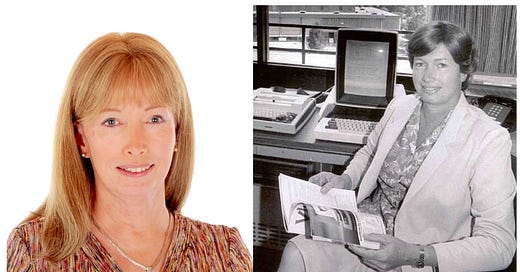Trans Woman And Computer Pioneer Lynn Conway Passed Away: Her Legacy Is Worth Knowing
If you are reading this on your mobile phone, you owe it to Lynn Conway, a transgender woman who pioneered the microchip technology that makes it possible. She passed away at age 86.
Yesterday, news broke that transgender woman and computer pioneer Lynn Conway passed away at the age of 86. Her story is nothing short of remarkable. Conway helped pioneer early supercomputers at IBM but was fired after she transitioned. She went “stealth” and had to rebuild her career from the ground up, starting as a contract programmer at Xerox with “no experience.” Then, she did it all over again, pioneering VLSI—a groundbreaking technology that allowed for microchips to be made small enough to fit in your pocket, paving the way for smartphones and personal computers. In 1999, she broke stealth, becoming an outspoken advocate for transgender people.
Conway first attempted to transition at MIT in 1957 at the age of 19 years old. At the time, the environment was not accepting enough for transgender people to do so. She would have faced enormous barriers to medical transition, as few doctors were knowledgeable enough to prescribe hormone therapy a the time. Like many transgender people seeing enormous barriers to care, she spent the following years closeted.
Eventually, she was hired by IBM where she helped develop the world’s fastest supercomputer at the time on the Advanced Computing System (ACS) project. The computer would become the first to use a “superscalar” design, which made it capable of performing several tasks at once, dramatically improving its performance and making it much faster than previous computers. Despite her pivotal role in the project, she was fired when she informed her employer that she wanted to transition.
What she did next is nothing short of remarkable. Realizing that as an openly transgender woman in 1968, few companies would hire her, she went “stealth” and pretended she had no significant prior experience in computers. She quickly advanced through the ranks and was hired by Xerox, where she famously developed VLSI, or Very Large Scale Integration. This groundbreaking technology allowed for thousands of transistors to be packed onto a single chip, revolutionizing electronics by making cell phones and modern computers possible through miniaturization and increased processing power.
Conway didn’t stop there. After gaining fame for her computer innovations, she came out in 1999 to advocate for transgender people. She was among the early critics of Dr. Kenneth Zucker, an anti-trans researcher still cited today by those working to ban gender-affirming care. Conway slammed Zucker for practicing “reparative therapy,” a euphemism for conversion therapy. Notably, Zucker’s research continues to make false claims that “80% of transgender kids desist from being trans,” numbers based on his clinic's practices, which closely mirrored gay conversion therapy. That clinic has since been shut down over those practices.
Often, those opposed to transgender people paint a picture of gender transition as something new, unique, or unsustainable. Similarly, many who transition are told they cannot be successful as transgender individuals. Such claims are often weaponized by anti-trans activists like Matt Walsh, who once mockingly asked, “What exactly have ‘transgender Americans’ contributed?” Conway’s life was a resounding rebuke to these attacks. She attempted to transition at a young age in the 1950s, revolutionized computing twice from scratch, and made the cell phone Walsh likely used to post such a question possible.
Perhaps more importantly, Conway’s life gave transgender people another gift: a visible example that we can grow old, and a reminder that we have always been here. In a world where so many of us have had to hide in silence or stealth, where representation has been denied, and where we are told that our lives will be too dangerous to live, Conway proved that one can be trans and live a long, fulfilling, and proud life.





I had the opportunity to interview her as part of a class project while working on a degree of mine. She was an amazing person to talk to and truly an inspiration.
Thank you for sharing this story, Erin. Lynn was a remarkable, beautiful, strong woman and had you not written this post, many people may not have known about her.
I love the last paragraph—a fitting reminder and perfect context. ❤️❤️❤️